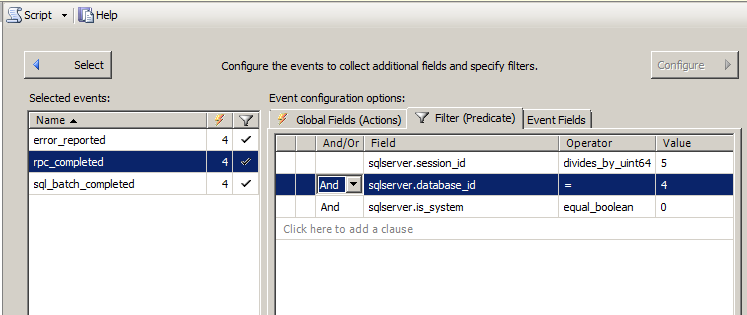I have created an extended events session in which I wanted to see all queries using nolock hint. I have decided to use it instead of sql trace in order to minimaze possible performance impact. Session was created like with following statement:
CREATE EVENT SESSION [SCOMDB_debug] ON SERVER
ADD EVENT sqlserver.deprecation_announcement(
ACTION(sqlserver.client_hostname,sqlserver.database_name,sqlserver.nt_username,sqlserver.session_id,sqlserver.sql_text,sqlserver.transaction_id,sqlserver.username)),
ADD EVENT sqlserver.rpc_completed(
ACTION(sqlserver.client_hostname,sqlserver.database_name,sqlserver.nt_username,sqlserver.session_id,sqlserver.sql_text,sqlserver.transaction_id,sqlserver.username)
WHERE ([sqlserver].[like_i_sql_unicode_string]([sqlserver].[sql_text],N'%NOLOCK%'))),
ADD EVENT sqlserver.rpc_starting(
ACTION(sqlserver.client_hostname,sqlserver.database_name,sqlserver.nt_username,sqlserver.session_id,sqlserver.sql_text,sqlserver.transaction_id,sqlserver.username)
WHERE ([sqlserver].[like_i_sql_unicode_string]([sqlserver].[sql_text],N'%NOLOCK%'))),
ADD EVENT sqlserver.sp_statement_completed(
ACTION(sqlserver.client_hostname,sqlserver.database_name,sqlserver.nt_username,sqlserver.session_id,sqlserver.sql_text,sqlserver.transaction_id,sqlserver.username)
WHERE ([sqlserver].[like_i_sql_unicode_string]([sqlserver].[sql_text],N'%NOLOCK%'))),
ADD EVENT sqlserver.sp_statement_starting(
ACTION(sqlserver.client_hostname,sqlserver.database_name,sqlserver.nt_username,sqlserver.session_id,sqlserver.sql_text,sqlserver.transaction_id,sqlserver.username)
WHERE ([sqlserver].[like_i_sql_unicode_string]([sqlserver].[sql_text],N'%NOLOCK%'))),
ADD EVENT sqlserver.sql_batch_completed(
ACTION(sqlserver.client_hostname,sqlserver.database_name,sqlserver.nt_username,sqlserver.session_id,sqlserver.sql_text,sqlserver.transaction_id,sqlserver.username)
WHERE ([sqlserver].[like_i_sql_unicode_string]([sqlserver].[sql_text],N'%NOLOCK%'))),
ADD EVENT sqlserver.sql_batch_starting(
ACTION(sqlserver.client_hostname,sqlserver.database_name,sqlserver.nt_username,sqlserver.session_id,sqlserver.sql_text,sqlserver.transaction_id,sqlserver.username)
WHERE ([sqlserver].[like_i_sql_unicode_string]([sqlserver].[sql_text],N'%NOLOCK%'))),
ADD EVENT sqlserver.sql_statement_completed(
ACTION(sqlserver.client_hostname,sqlserver.database_name,sqlserver.nt_username,sqlserver.session_id,sqlserver.sql_text,sqlserver.transaction_id,sqlserver.username)
WHERE ([sqlserver].[like_i_sql_unicode_string]([sqlserver].[sql_text],N'%NOLOCK%'))),
ADD EVENT sqlserver.sql_statement_starting(SET collect_statement=(1)
ACTION(sqlserver.client_hostname,sqlserver.database_name,sqlserver.nt_username,sqlserver.session_id,sqlserver.sql_text,sqlserver.transaction_id,sqlserver.username)
WHERE ([sqlserver].[like_i_sql_unicode_string]([sqlserver].[sql_text],N'%NOLOCK%')))
ADD TARGET package0.event_file(SET filename=N'M:\MSSQL11.SCOMDB\MSSQL\Log\SCOMDB_debug.xel',max_file_size=(500))
WITH (MAX_MEMORY=40960 KB,EVENT_RETENTION_MODE=ALLOW_SINGLE_EVENT_LOSS,MAX_DISPATCH_LATENCY=30 SECONDS,MAX_EVENT_SIZE=0 KB,MEMORY_PARTITION_MODE=NONE,TRACK_CAUSALITY=OFF,STARTUP_STATE=OFF)
GO
The result was that database instance (used for SCOM databases) became very slow and application was almost unusable.
Wait stats were full of SOS_SCHEDULER_YIELD and PREEMPTIVE_XE_DISPATCHER and I could see many long running queries in sys.dm_exec_requests waiting mostly on CPU as well.
Is it expecated bahaviour? I can imagine that [like_i_sql_unicode_string] operator can be quite performance consuming but still I would expect much better performance.
Is there any other filter in ex events which could be used to catch queries which contain 'sometext'?

